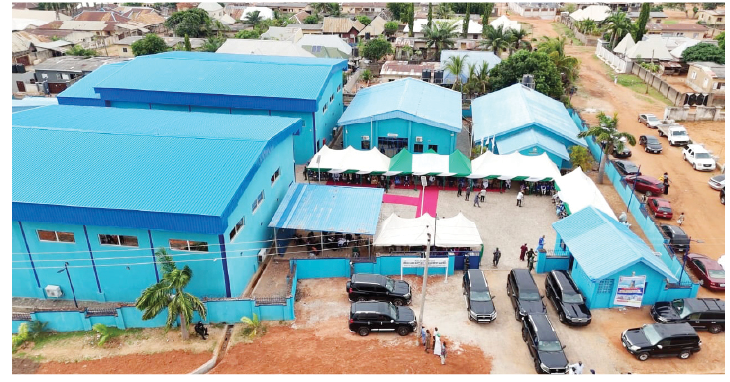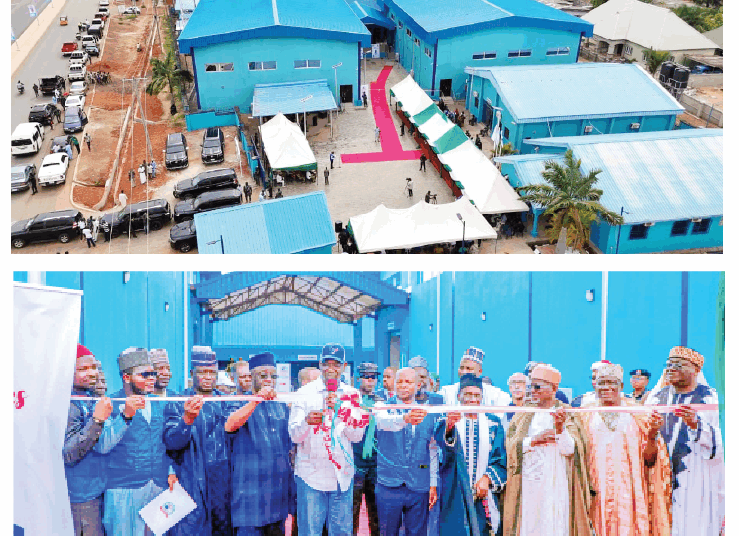The Nasarawa State government has taken a significant step towards ending anomalies associated with the supply and distribution of illicit drugs and other associated health commodities across the state.
Hence, Governor Abdullahi Sule recently unveiled a twin pharma-grade state-of-the-art facility warehouse for the integration of public health products and essential medicines. The facility, rated by the Pharmaceutical Council of Nigeria (PCN) as the third-best pharmaceutical warehouse in Nigeria, is the manifestation of his administration’s commitment to revolutionising healthcare delivery and combating substandard medicines.
History
The idea for a medication warehouse was conceived during the era of the first executive governor of the state, Abdullahi Adamu. However, the dream was not realised following challenges with the contractor who was supposed to handle the project. Hence, former Governor Umaru Tanko Al-Makura inherited and completed the facility, known as the Central Medical Stores, in 2011. But the store hardly met the supply needs of the over 400 health facilities across the state, while the structure at the health ministry level failed to address the challenges of rising fake, adulterated and expired drugs, as well as the lingering out-of-stock cases, which impede the health sector’s operations.

Ray of hope
Understanding how critical the distribution and supply chain is to effective healthcare delivery, Gov Sule decided to strengthen the area holistically by freeing it from the ministry‘s administrative bottlenecks and giving it some measures of independence. In March 2021, he established the Nasarawa State Drug and Supplies Management Agency with the enabling legislation to back it. In October of that year, the agency became fully operational by appointing a general manager, a pharmacist, Haruna Muhammad Wakil, to oversee its operations.
On its website, the agency spelt out its mandate as follows: “We are an organisation responsible for the efficient procurement, storage, distribution, and management of pharmaceuticals and medical supplies.
“We play a critical role in ensuring the availability of quality medicines and healthcare products in both the public and private sectors. We operate within healthcare systems, supporting hospitals, clinics and pharmacies by maintaining a steady supply of essential drugs.”
Meanwhile, experts are unanimous that in a sector bogged down by unending sharp practices involving the circulation of fake, adulterated, substandard, and expired pharmaceutical products and commodities, the task before Wakil’s agency is no doubt daunting.
The National Agency for Food and Drug Administration and Control (NAFDAC), Nigeria’s agency battling
to halt the spread of fake and substandard drugs in the country, agreed that the war against the menace had been tough. It described the influx as alarming, noting that most of the drugs in circulation in the country were fake and substandard, causing illnesses, disabilities and death in Nigeria and other West African countries.
However, Gov Sule expressed optimism that the state would collaborate with key stakeholders to address the challenges while promising an environment enabling a seamless operation.
He said, “This upgrade ensures medications are stored under optimal conditions, addressing the critical issue of poorly stored drugs, which can become more dangerous than expired ones.”
The health commissioner, Dr Gaza Gwamna, assured that NASDSMA now supplies 800 verified health commodities to 484 healthcare facilities statewide, ensuring traceability, affordability and quality.
He said, “This is Nigeria’s first centralised one-stop solution to eliminate fake, adulterated or substandard drugs.”
He commended Gov Sule for his passion and commitment towards the successful completion of the project, particularly with the prompt approval and release of the counterpart fund required from the state.
Meanwhile, the PCN, through its official, Benjamin Nwora, lauded Nasarawa as a trailblazer in the ongoing effort to combat counterfeit drugs.
He said, “Only Nasarawa and Kaduna have achieved ‘Maturity Level Three’, aligning with the federal drug distribution policies.”
Wakil said his agency was leaving no stone unturned in its drive to overcome the challenges while allaying all fears expressed.
He further said the agency had bypassed middlemen who encouraged the supply of fake and substandard products into the drug market.
Beyond this, the agency, he pointed out, had sustained delivery of 788 high quality and affordable health commodities to 484 enrolled facilities, and equally adopted a price equalisation strategy across board by pegging dispensing prices between 10 and 20 percent below market costs, even as it adopted the home-grown inventory management tool to allow for end-to-end visibility.





